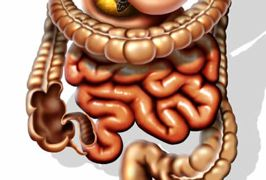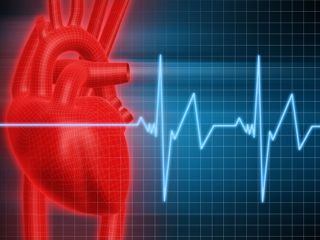
Guest blogger Dr. Turbide shares some expertise with us on Crohn's disease and other gastrointestinal disorders. Dr. Christian Turbide is a gastrointerologist working...
 Crohn’s Disease is one of two diseases considered to be a form of Inflammatory Bowel Disease (IBD). It is characterized by an inflammation mostly of the ilium, or end of the small intestines. But it can occur anywhere along the digestive tract. Characterized by intestinal pain, diarrhea and malabsorption of nutrients (Murray, 1996, p. 441).
Crohn’s Disease is one of two diseases considered to be a form of Inflammatory Bowel Disease (IBD). It is characterized by an inflammation mostly of the ilium, or end of the small intestines. But it can occur anywhere along the digestive tract. Characterized by intestinal pain, diarrhea and malabsorption of nutrients (Murray, 1996, p. 441). Digestive tract, but tends to occur in the colon and the ilium (small intestine) near the ileocecal valve (Lipski, 2005, p. 260). Can also be called “right-sided disease.”
There is some research suggesting that the measles virus may cause Crohn’s Disease (Lipski, 2005, p. 261). The disease’s seasonal cycle characteristic suggests that it may be allergy related (Lipski, 2005, p. 261). It is usually diagnosed by age 40, and tends to run in families (Lipski, 2005, p. 260). There is a higher incidence of Crohn’s amongst women who use oral contraceptives (Lipski, 2005, p. 261). Fungal allergies and sensitivity to molds tend to trigger symptoms (Lipski, 2005, p. 261). There is a genetic component to Crohn’s that seems to be triggered by infections, food sensitivities, inflammation of blood vessels and antigen hypersensitivity (Lipski, 2005, p. 262).
Diagnosis is usually done through a combination exams including endoscopy to see the lining of the gastrointestinal tract, X-rays and blood tissue tests (Mayoclinic.org). Stool tests are often used to detect bacterial infections that can trigger flare-ups. By using endoscopy, the practitioner determines where in the digestive tract the inflammation is predominant.
At worst, Inflammatory Bowel Disease may require surgery to remove damaged parts of the colon (Rakel, 2007, p. 549). Other medical treatment may involve anti-inflammatory drugs, steroids, immune modulators and antibiotics (Lipski, 2005, p. 263). A recent treatment using a protease inhibitor called BBI is in early stages of use (Lipski, 2005, p. 263). These treatments may help by controlling symptoms, but also carry their own risks and side-effects. Medications along with complementary therapies to prevent flare-ups seems to be most effective (Lipski, 2005, p. 264).
Flaxseed oil can help with reducing inflammation of the intestinal wall (Murray, 1996, p. 442). Boswelia, an Ayurvedic herb, and Aloe Vera (Rakel, 2007, p. 547).
Diets that help with reducing and eliminating food allergies are extremely helpful in reducing symptoms of Crohn’s disease (Murray, 1996, p. 442). Defined formula diets help to improve the nutritional status of patients with IBD and can prevent complications from related surgeries (Rakel, 2007, p. 542). As a primary therapy for CD, a defined formula diet has proven to invoke remission of the disease in 30% - 80% of patients (Rakel, 2007, p. 542).
The Specific Carbohydrate Diet which eliminates cereal grains and their derivatives (including sweeteners other than honey), legumes, potatoes, lactose containing dairy and sucrose, is most effective for patients with CD (Rakel, 2007, p. 542). Many IBD patients find great improvement in symptoms using an elimination diet (Lipski, 2005, p. 264).
It is essential to support a healthy gut flora in the intestinal tract. Many studies show the effectiveness of probiotics on IBD sufferers (Lipski, 2005, p. 262). Different strain combinations will work for different people so there needs be some experimentation to find the most helpful (Lipski, 2005, p. 262).
Consider Nutritional Supplementation: High potency multi, Vitamin C, Vitamin E, Pancreatin (Murray, 1996, p. 442). Fish oils, Iron and Zinc (Rakel, 2007, p. 545).
It is widely believed that stress aggravates IBD, but a German study did not find a relationship between symptoms of CD and stressors (Rakely, 2007, p. 547, Lipski, p. 261). However, suffering caused by the disease may lead to depression and emotional problems requiring attention.
The Standard American Diet (SAD) can only aggravate issues in the digestive tract. Current trends using high-fructose corn syrup in many food products is known to cause inflammation as well as trans-fats found in many fast foods and prepared foods. These trends in eating have contributed to greater prevalence of irritable bowel syndrome and the closely related inflammatory bowel diseases of Crohn’s and Ulcerative Colitis. By educating in nutrition and healthy living, we may see a dramatic decrease in the appearance of CD and other digestive sickness.
Sources
Lipski, L. 2005. Digestive Wellness. New York: McGraw-Hill.
Mayo Clinic Website: www.mayoclinic.org
Murray, M. 1996. Encyclopedia of Nutritional Supplements. New York: Three Rivers Press.
Rakel, D. 2007. Integrative Medicine. Philadelphia, PA: Saunders

Guest blogger Dr. Turbide shares some expertise with us on Crohn's disease and other gastrointestinal disorders. Dr. Christian Turbide is a gastrointerologist working...
